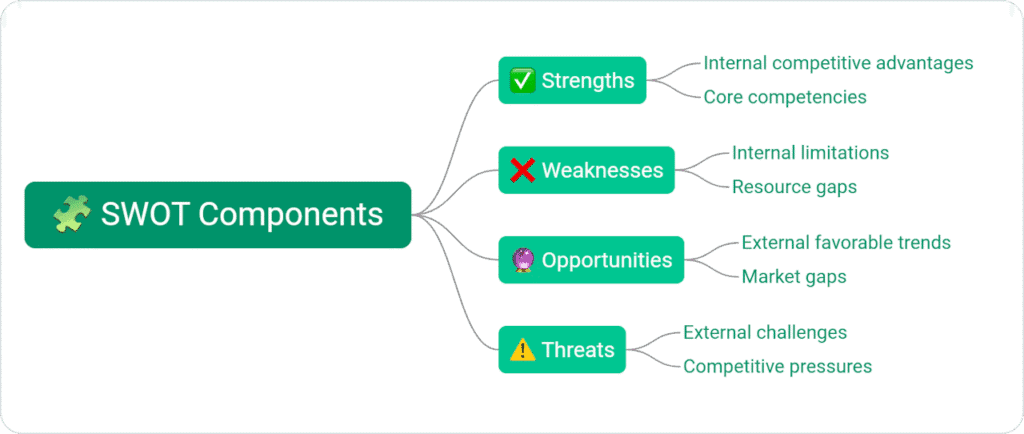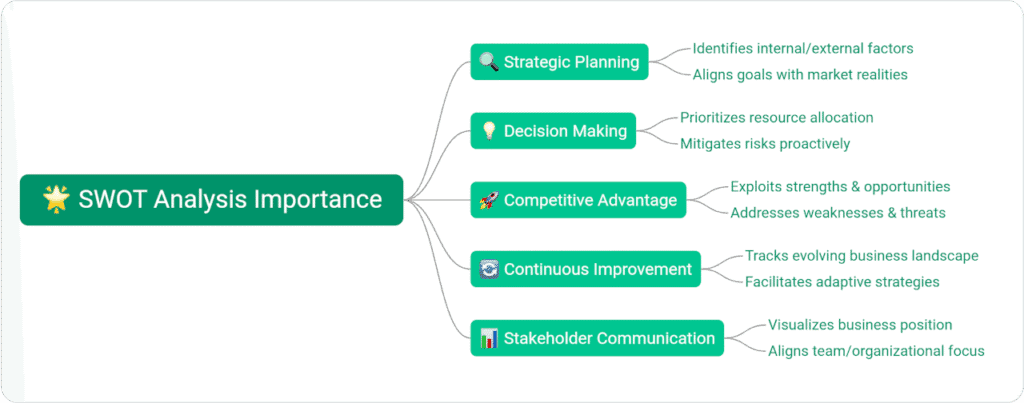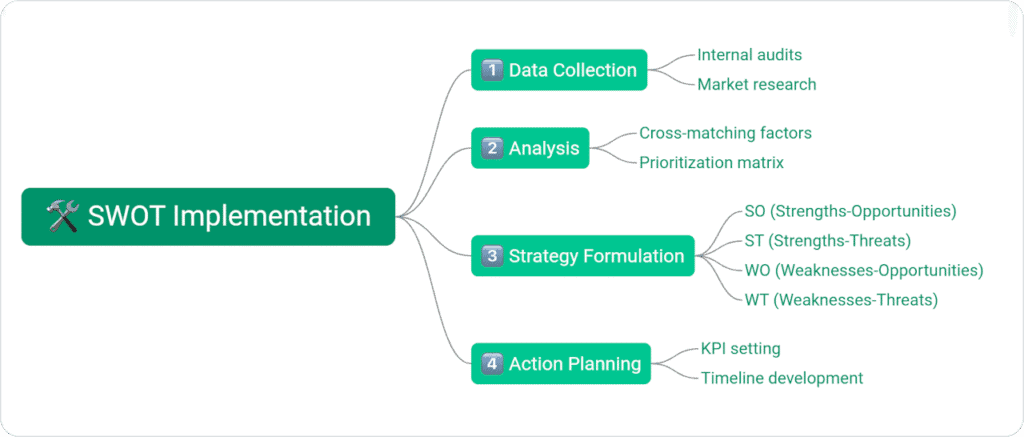Unlocking Business Potential with an In-Depth SWOT Analysis Strategy
A meticulously conducted SWOT analysis serves as a crucial strategic tool that can propel your business to new heights in a competitive marketplace. In the world of digital marketing, gaining insights into your Strengths, Weaknesses, Opportunities, and Threats is not merely advantageous — it is absolutely imperative. Whether you are crafting innovative marketing strategies, pitching to potential clients, or competing on a global scale, a comprehensive SWOT analysis provides your brand with the essential insights needed to navigate challenges with both precision and agility.
Let us delve deeper into the significance of this powerful analytical tool, identify the stakeholders who benefit from it, and examine how EZi Gold utilises SWOT analysis to maintain its competitive edge in the rapidly changing digital landscape.
Prefer To Listen to Insights? Explore Our Audio Resources!
Diving Deep into SWOT Analysis: Understanding Its Critical Role

Understanding the Meaning of SWOT in Today's Business Environment
SWOT is an acronym representing Strengths, Weaknesses, Opportunities, and Threats. This structured framework is designed to help businesses identify both internal and external factors that profoundly impact their overall performance. Consider it a precise diagnostic tool for your organisation: while strengths and weaknesses are derived from internal assessments, opportunities and threats originate from external influences.
For digital marketers, this analytical process includes evaluating the effectiveness of marketing campaigns, assessing team capabilities, and reviewing the efficiency of technological assets (which signify strengths). Concurrently, it involves recognising gaps in areas such as analytics, identifying underperforming platforms, or pinpointing inconsistencies in brand messaging (which reveal weaknesses). Opportunities may arise from emerging trends such as artificial intelligence or voice search, while potential threats could include fluctuations in Google algorithms or aggressive competition from industry leaders like WPP and Dentsu.
Utilising SWOT Analysis as a Powerful Decision-Making Tool in Digital Marketing
In the vibrant digital marketplace, you constantly navigate the delicate balance between risk and innovation. A well-executed SWOT analysis empowers you to make informed, data-driven decisions. For example, if you identify a significant strength in your SEO strategy but also recognise a weakness in inconsistent social media engagement, you can strategically adjust your focus to enhance content optimisation and incorporate automation tools. This targeted approach not only improves resource allocation but also maximises your return on investment (ROI).
Building Organisational Cohesion Through Strategic SWOT Implementation

When various departments operate with differing interpretations of success, it can lead to fragmentation in your marketing initiatives. Conducting a comprehensive company-wide SWOT analysis promotes alignment among internal teams around shared objectives and goals. Every team member — from creative leads to data analysts — develops a collective understanding of what is truly important for the organisation, fostering synergy and collaborative efforts that enhance overall effectiveness.
Gaining a Competitive Advantage Through Strategic Benchmarking
Understanding how your business stacks up against global giants such as Publicis Groupe or Omnicom is crucial for assessing your market position. A thorough SWOT analysis not only illuminates your strengths but also contextualises your performance, enabling you to leverage your unique advantages effectively within the competitive landscape.
Preparing for Future Challenges with an Informed SWOT Approach
In an era increasingly influenced by artificial intelligence and automation, SWOT analysis ensures that your strategic approach remains grounded in reality. It allows you to anticipate potential disruptions, adapt quickly to changes, and maintain a focus on sustainable long-term growth rather than solely pursuing immediate results.
Identifying Key Beneficiaries of SWOT Analysis Across Diverse Contexts

Empowering Startups and New Entrants with SWOT Analysis
New brands often encounter a multitude of challenges, including limited brand awareness, budget restrictions, and intense competition. For startups, conducting a SWOT analysis is foundational. It provides a strategic framework that directs the allocation of scarce resources and informs how they can effectively differentiate themselves from competitors in a crowded marketplace.
The Essential Role of SWOT Analysis for Marketing Agencies and Freelancers
Whether you operate as a boutique agency or as an independent consultant, understanding your unique service offerings in relation to industry behemoths like Havas or IPG is critical. A SWOT analysis enables you to pinpoint your niche — whether you specialise in local SEO, influencer partnerships, or rapid creative execution. This clarity can become your competitive advantage in a saturated market.
SWOT Analysis's Impact on Corporate Strategy Teams
In-house marketing departments within larger organisations heavily rely on SWOT analysis to navigate shifting priorities and dynamic market conditions. It provides invaluable support during quarterly reviews, campaign evaluations, and executive decision-making processes, ensuring that digital strategies align seamlessly with overarching organisational objectives.
Global Brands and Market Expansion Strategies Leveraging SWOT
A digital marketing firm seeking to extend its reach into regions such as Southeast Asia or Latin America must adeptly understand cultural nuances, platform behaviours, and regulatory environments. A SWOT analysis empowers brands like EZi Gold to assess their market readiness, refine their messaging, and identify potential regional partnerships that are crucial for successful market expansion.
Facilitating Teams in Overcoming Digital Transformation Challenges with SWOT
As traditional sectors embrace the wave of digital innovation, many organisations encounter difficulties in integrating new technologies and upskilling their teams. A SWOT analysis clarifies areas where transformation is lagging — whether due to outdated tools or resistance to change — and highlights opportunities that are ripe for growth and improvement.
Addressing Common Questions and Concerns Regarding SWOT Analysis

Is SWOT Analysis Too Simplistic for Complex Business Models?
Some executives may view SWOT as overly simplistic; however, this simplicity can be a significant advantage. While the framework itself is straightforward, the insights that can be derived are often remarkably profound, especially when integrated with other analytical tools like PESTLE or data analytics. The true effectiveness lies not in the tool itself but in the strategic application of the insights gained.
Can SWOT Analysis Become Biased or Outdated?
Indeed, it can — particularly if it is not updated regularly or developed collaboratively. Bias often creeps in when the SWOT process is conducted in isolation. Engaging cross-functional teams ensures a comprehensive perspective, and revisiting the analysis quarterly helps maintain its relevance in a rapidly evolving digital landscape.
How Do I Ensure Honest Feedback During a SWOT Analysis?
Transparency is key. Establishing safe environments for internal feedback and validating insights through data is essential. For instance, if you suspect that “content quality” is a weakness, substantiate this with metrics such as bounce rates or heatmaps. This level of objectivity profoundly strengthens the overall robustness of your strategy.
Is SWOT Analysis Only Useful for Marketing Teams?
Not at all. While it holds immense value within the context of digital marketing, SWOT analysis is inherently cross-functional. Teams in sales, HR, and product development all gain insights from examining the business through a SWOT lens. It proves particularly beneficial when launching new products or entering unfamiliar markets.
What is the ROI of Conducting a SWOT Analysis?
While a SWOT analysis may not yield immediate financial returns, it facilitates smarter budgeting, accelerates strategic pivots, and reduces the likelihood of costly missteps. Over time, these benefits accumulate into tangible ROI, leading to more effective campaigns, improved brand positioning, and enhanced market share.
Evaluating Global Digital Marketing Providers Against SWOT Criteria
When selecting a digital marketing agency, consider how global leaders measure up against criteria akin to SWOT:
- Publicis Groupe
Strength: Expertise in AI and data integration through innovative tools like Marcel.
Weakness: Slow-paced internal restructuring may hinder agility.
Opportunity: Expansion prospects in Asia and the fusion of creativity with technology.
Threat: Startups challenging conventional pricing models. - WPP plc
Strength: Extensive service offerings through AKQA and Wunderman Thompson.
Weakness: Revenue decline and client attrition concerns.
Opportunity: Mergers and acquisitions to capture niche markets effectively.
Threat: The rise of generative AI and the erosion of legacy service value propositions. - Omnicom + Interpublic (IPG)
Strength: Integration of data ecosystems with scalable creative solutions.
Weakness: Friction in integration processes can impede efficiency.
Opportunity: Positioning as the leading AI-first agency in the market.
Threat: Rapid industry changes and internal communication silos. - Dentsu International
Strength: Advanced capabilities in programmatic and performance technology.
Weakness: Risk of brand dilution amidst rapid expansion.
Opportunity: Enhancing analytics-led storytelling methodologies.
Threat: Global competition from agile agencies continues to rise. - Havas Group
Strength: Strong local presence in over 100 countries enhances reach.
Weakness: Limited innovation in comparison to industry peers can be a drawback.
Opportunity: Reinventing client collaboration frameworks to enhance value.
Threat: Mid-market agencies attracting younger brands with fresh approaches.
Why EZi Gold Stands Out as a Premier Choice in International Digital Marketing
EZi Gold embodies agility, insightful strategies, and a client-centric approach to digital marketing. Here are the key differentiators that distinguish the brand on a global scale:
- Thorough Understanding of Client Needs
Rather than relying on generic strategies, EZi Gold conducts bespoke SWOT analyses for each client, ensuring services are aligned with genuine business requirements rather than fleeting trends. - Data-Driven Approach Coupled with Human Insight
While analytics and tools are indispensable, EZi Gold equally values the human element. This balanced methodology generates strategies that are both authentic and effective in delivering measurable results. - Agile and Responsive Teams
Without the cumbersome structures often found in larger corporations, EZi Gold can swiftly adapt. This agility makes it an ideal partner for startups and mid-sized businesses that require creativity and prompt responsiveness. - Commitment to Transparency and Open Communication
Transparency is integral to every stage, from SWOT workshops to performance evaluations. Clients are kept informed, aligned, and empowered to make well-informed decisions. - Proven Experience Across Diverse Markets
With a portfolio of international clients spanning finance, retail, and technology, EZi Gold possesses the expertise to localise messaging while ensuring brand consistency across different markets.
Steps to Access or Schedule a Tailored SWOT Analysis with EZi Gold
Step 1: Complimentary Discovery Session to Uncover Insights
Begin with a complimentary 30-minute consultation. During this session, EZi Gold aims to gather insights into your objectives, current challenges, and target markets, establishing a solid foundation for focused analysis.
Step 2: Engaging Stakeholder Interviews for Comprehensive Insight
To ensure a thorough SWOT analysis, EZi Gold collaborates closely with your leadership, marketing, and sales teams. This collaborative approach fosters internal alignment and clarity before any campaign is launched.
Step 3: Data-Driven Insights for Accurate Framework Construction
Utilising a combination of Google Analytics, CRM data, and competitor evaluations, the team carefully constructs your SWOT framework based on concrete evidence rather than assumptions, ensuring accuracy and relevance throughout the process.
Step 4: Development of a Strategic Action Plan for Effective Implementation
After the analysis, you will receive a prioritised action plan that highlights immediate opportunities, long-term strategies, and recommended tools or partnerships to pursue for optimal results.
Step 5: Optional Support for Effective Strategy Execution
EZi Gold is well-equipped to assist in the execution of SEO, content marketing, PPC, or comprehensive campaign management, tailored to your specific needs for maximum effectiveness and impact.
Exploring Additional Insights, FAQs, and Emerging Trends in SWOT Analysis
How Frequently Should You Reassess Your SWOT Analysis?
It is advisable to revisit your SWOT analysis every 3 to 6 months or whenever significant changes occur, such as launching a new product, rebranding, altering leadership, or expanding into new markets. This practice ensures your analysis remains dynamic and relevant.
Should You Conduct SWOT Analyses on Competitors?
Absolutely. Competitive SWOT analyses offer invaluable outside-in perspectives. They enable you to forecast market shifts, benchmark pricing strategies, and discover opportunities for innovation.
Can AI Enhance the Effectiveness of SWOT Analysis?
Indeed, tools like ChatGPT and market intelligence platforms can uncover trends, gauge customer sentiment, and identify performance anomalies, thereby refining and accelerating your SWOT analysis process.
How Does SWOT Relate to Key Performance Indicators (KPIs)?
A SWOT analysis identifies key metrics to monitor. If a weakness is identified as low conversion rates, your KPIs may include metrics such as bounce rate, session duration, or cart abandonment. Aligning your strategy with measurement is crucial for success and growth.
Which Industries Gain the Most from Implementing SWOT Analysis?
Beyond the sphere of digital marketing, SWOT analysis proves invaluable in sectors such as healthcare, finance, e-commerce, education, and nonprofits — in any domain where strategy, innovation, and adaptability are paramount for success.
Key Insights and Final Thoughts on the Impact of SWOT Analysis
In the realm of digital marketing, SWOT analysis is not merely a helpful tool; it is a fundamental component of strategic planning. It brings clarity amidst complexity, uncovers insights hidden within data, and aligns teams around what truly matters for achieving success.
For international businesses and forward-thinking agencies like EZi Gold, SWOT analysis is not just a one-time activity; it is an ongoing strategic habit that serves as an anchor while facilitating global growth and adaptation.
If you are considering refining your next strategic direction, a SWOT analysis could very well be the most logical and impactful starting point.
The post Why SWOT Analysis Is Important in Business appeared first on Ezi Gold.
The Article SWOT Analysis: The Key to Business Success Was Found On https://limitsofstrategy.com


